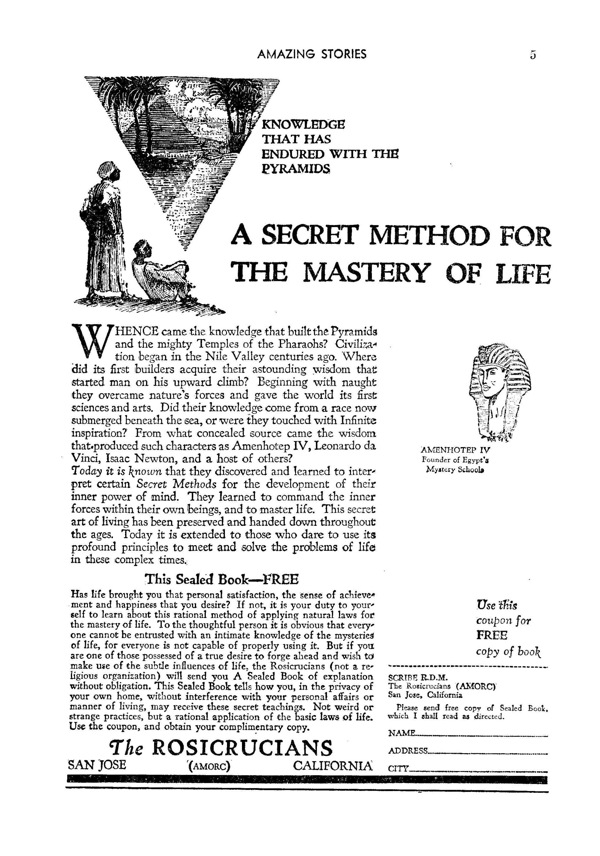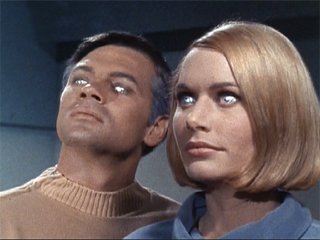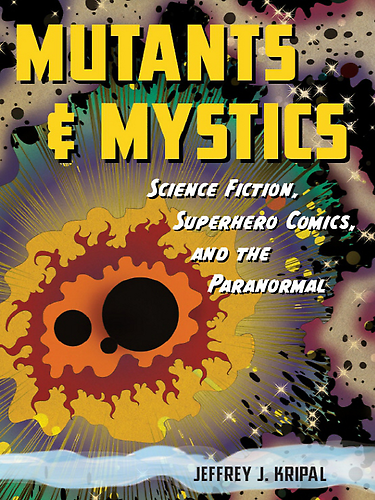Jeffrey Kripal has returned to discuss his latest book addressing the esoteric and the paranormal in popular culture. In this case his new book is Mutants & Mystics: Science Fiction, Superhero Comics, and the Paranormal (University of Chicago Press, 2011). From the book’s description:
In many ways, twentieth-century America was the land of superheroes and science fiction. From Superman and Batman to the Fantastic Four and the X-Men, these pop-culture juggernauts, with their “powers and abilities far beyond those of mortal men,” thrilled readers and audiences—and simultaneously embodied a host of our dreams and fears about modern life and the onrushing future.
But that’s just scratching the surface, says Jeffrey Kripal. In Mutants and Mystics, Kripal offers a brilliantly insightful account of how comic book heroes have helped their creators and fans alike explore and express a wealth of paranormal experiences ignored by mainstream science. Delving deeply into the work of major figures in the field—from Jack Kirby’s cosmic superhero sagas and Philip K. Dick’s futuristic head-trips to Alan Moore’s sex magic and Whitley Strieber’s communion with visitors—Kripal shows how creators turned to science fiction to convey the reality of the inexplicable and the paranormal they experienced in their lives. Expanded consciousness found its language in the metaphors of sci-fi—incredible powers, unprecedented mutations, time-loops and vast intergalactic intelligences—and the deeper influences of mythology and religion that these in turn drew from; the wildly creative work that followed caught the imaginations of millions. Moving deftly from Cold War science and Fredric Wertham’s anticomics crusade to gnostic revelation and alien abduction, Kripal spins out a hidden history of American culture, rich with mythical themes and shot through with an awareness that there are other realities far beyond our everyday understanding.
TheoFantastique: Jeff, thanks for coming back a second time to discuss your research and writing on the paranormal and popular culture. What kind of reception has Mutants & Mystics gotten from reviewers, and particularly among those working in religious and cultural studies?
Jeffrey Kripal: It’s hard to say, as it just came out, but there was a fairly substantial Roundtable Discussion of it on Patheos, which included, of course, a response from you. The respondents were generally enthusiastic, though some expressed reservations about some of my claims and readings. I think what they really meant is that I take the paranormal too seriously. But they were all kind, professional, and humane. And, besides, I appreciate their reservations. Heck, I don’t even believe myself sometimes.
TheoFantastique: I was struck early on in your book where you encourage the “deep reader of science fiction and superhero comics” to consider the influence of gnostic and esoteric literature. Yet curiously, we often hear the argument made that science fiction is incompatible with religion and spirituality. Given what you’ve argued in your book, what do you think about the influence of religion in general in science fiction and comics, and why do you think the gnostic and esoteric has been overlooked in particular?
Jeffrey Kripal: I think the influence of Gnostic and esoteric ideas on science fiction is patently obvious, and that this is only resisted by readers who are invested in some sort of materialist or scientistic worldview. “Science” is really a kind of code for the “supernatural” in much of this literature. Certainly not all of it. Sci-fi culture, like any culture, is radically plural.
TheoFantastique: I think many are used to thinking of science fiction as having more secular origins, and yet you speak of the role of certain schools of thought in “the occult origins and historical developments of fantasy literature and science fiction.” Are we talking about divergent streams of development, and how have Rosicrucianism and Theosophy played a part in the occult aspects of this?
 Jeffrey Kripal: If you look at the reverence and wonder with which science is imbued, say, in early pulp fiction, you cannot help but see a certain religiosity at work here. You also see, by the way, a whole bunch of Rosicrucian ads advertising booklets on how to develop one’s own superpowers. This is not speculation on my part. Geez, just open almost any volume of AMAZING STORIES, and there are the Rosicrucians.
Jeffrey Kripal: If you look at the reverence and wonder with which science is imbued, say, in early pulp fiction, you cannot help but see a certain religiosity at work here. You also see, by the way, a whole bunch of Rosicrucian ads advertising booklets on how to develop one’s own superpowers. This is not speculation on my part. Geez, just open almost any volume of AMAZING STORIES, and there are the Rosicrucians.
The manifest means of human or cosmic transformation in sci-fi, of course, are framed as scientific, but these means and methods are often indistinguishable from magic. That is their latent meaning. Arthur C. Clarke’s famous line about how any sufficiently advanced science is indistinguishable from magic was more insightful than probably even he recognized.
I also think something else is at work here. What cutting edge science does so well is show how “the impossible is real,” that is, it demonstrates that the universe is far, far weirder than we thought, and that this weirdness is not simply a function of our imaginations. It is the real. That’s so mind-blowing.
TheoFantastique: How significant have Stan Lee and Jack Kirby been to the development and exploration of esoteric mythemes in comics, and now by extension, in cinematic treatments of these comics?
Jeffrey Kripal: It was this team that created so many of the standard Marvel superheroes we see today on the silver screen. I remember Lee well as a kid. His chatty, friendly, playful way of interacting with his readers was just wonderful. We all felt like he was talking to us. That’s because he was. But it was Kirby who probably brought the real Gnostic and mystical sensibilities to these characters, mostly, I suspect, because he himself was so invested in these ideas and possibilities. He was fascinated by the ancient alien hypothesis, as well as by parapsychology, Kabbalah, psychical phenomena, and so on. Not that Lee has not also shown interest in such things from time to time. He sent a brief but lovely response to me years ago when I wrote him about my project. And his recent television series on “real superpowers” is a good example of his openness to this kind of approach. Thank you, Stan.
TheoFantastique: I was surprised to see you refer to Gene Roddenberry’s interest in psi phenomena and altered states of consciousness. It is well known that he was a secular humanist, and this comes through in the original Star Trek series. And yet as I consider your reference to his paranormal interests I recall many episodes where the paranormal surfaces, as in the second pilot episode “Where No Man Has Gone Before.” It features two crew members who encounter a phenomenon in space that gives them paranormal, almost godlike powers. Might this be an example of the “baptism” of the paranormal and esoteric in scientific guise so as to be more palatable to Roddenberry and other materialist-oriented science fiction fans?
 Jeffrey Kripal: Exactly. I am not sure there is any real contradiction here. One has to keep in mind that the whole language of “the psychical” and “the paranormal” was developed by intellectuals and humanist scholars in the late nineteenth and early twentieth centuries as ways of talking about these things that was not “supernatural.” I mean, the paranormal is precisely that—“normal,” and yet something beyond or “para” what we consider at the moment to be normal. Most of these intellectuals believed that the supernatural was simply the natural that we did not yet understand. These terms, of course, have been re-deployed by our present media in highly undisciplined, and often frankly silly, ways, but their origins were quite serious and quite precise.
Jeffrey Kripal: Exactly. I am not sure there is any real contradiction here. One has to keep in mind that the whole language of “the psychical” and “the paranormal” was developed by intellectuals and humanist scholars in the late nineteenth and early twentieth centuries as ways of talking about these things that was not “supernatural.” I mean, the paranormal is precisely that—“normal,” and yet something beyond or “para” what we consider at the moment to be normal. Most of these intellectuals believed that the supernatural was simply the natural that we did not yet understand. These terms, of course, have been re-deployed by our present media in highly undisciplined, and often frankly silly, ways, but their origins were quite serious and quite precise.
TheoFantastique: In your conclusion you refer to “our present mirrored cultures of religious fundamentalism and scientific materialism, which appear oddly united in their ferocious ‘damning’ of the paranormal.” What would you like to see by way of developments that might move us beyond this impasse? Including the paranormal on the research agendas of religious studies and cultural studies? Dialogue between the esoteric, religious and scientific communities? Other suggestions?
Jeffrey Kripal: We simply need to stop shaming, humiliating, demonizing, and dismissing individuals who come forward with heart-felt descriptions of their own encounters with the impossible. We also need to integrate these narratives and experiences into our models of the world, be these advanced in the humanities or the sciences. I am completely convinced that the cultural taboos around these things are really quite weak and basically insecure. They are basically bluffs. Or they are barks, not bites. If enough people stood up and just said, “Stop it,” it would, more or less, stop. The truth is that the vast majority of thinking individuals are utterly, and rightly, fascinated by these extraordinary events. Why do we have to be so damned boring? Why should we stay in our boxes?
TheoFantastique: Jeff, thank you again for the book, the interview, and the opportunity to be part of the discussion concerning it.
Jeffrey Kripal: Thank you, John. I always enjoy what you have to say. I think you are part of what makes our culture so interesting and so healthy. Thank you for saying “Stop” in your own way.
Related posts:
“Jeffrey Kripal – Authors of the Impossible: The Paranormal and the Sacred”






One Response to “Jeffrey Kripal Interview on Mutants & Mystics: Comics, Sci-Fi and the Paranormal”